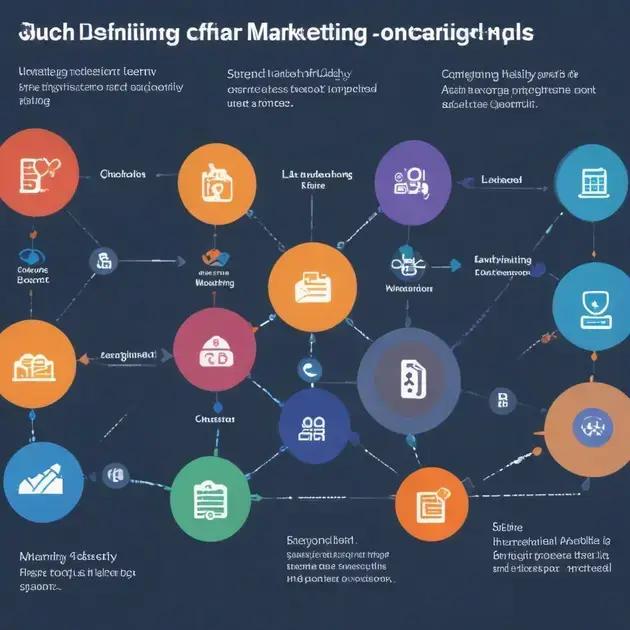B2B marketing software is vital for businesses aiming to enhance their marketing strategies. It offers features like CRM, email automation, and analytics, improving efficiency and lead management while helping businesses better target their audience and increase conversions.
B2B marketing software is essential in today’s competitive landscape. With the right tools, businesses can enhance their marketing strategies, optimize outreach, and foster better relationships with clients. This article delves into the core features and benefits of these powerful tools, walking you through choosing and implementing them effectively.
What is B2B Marketing Software?
B2B marketing software refers to a category of tools specifically designed to streamline and enhance the marketing efforts of businesses targeting other businesses. These software solutions provide a range of functionalities that help teams efficiently manage campaigns, analyze data, and improve customer relationships.
Key Components of B2B Marketing Software
Typically, B2B marketing software includes features such as customer relationship management (CRM), email marketing, lead generation tools, and analytics. These tools work together to facilitate the creation, tracking, and optimization of marketing strategies.
By using B2B marketing software, businesses can segment their audience more effectively, create personalized content, and automate repetitive tasks. This allows teams to focus on crafting successful strategies instead of getting bogged down by manual processes.
Examples of B2B Marketing Software
Some prominent B2B marketing software examples include HubSpot, Marketo, and Salesforce. Each of these platforms offers unique features tailored to specific marketing needs, from nurturing leads to tracking campaign performance.
These tools help businesses measure the effectiveness of their marketing efforts and adjust strategies based on real-time data. A solid understanding of your chosen software can lead to better engagement and increased conversions.
Key Features of Effective B2B Marketing Software

When choosing B2B marketing software, knowing the key features that make these tools effective is essential. The right software can dramatically enhance your marketing efforts and drive successful results.
1. Customer Relationship Management (CRM)
One of the most crucial features is an integrated CRM system. This allows businesses to manage interactions with clients and potential leads seamlessly. A good CRM helps track communication history, follow-ups, and customer preferences.
2. Email Marketing Automation
Email marketing is vital in B2B strategies. Effective software should offer automation capabilities that allow you to create, send, and analyze email campaigns easily. Customized email sequences can nurture leads at different stages of the buying journey.
3. Lead Generation Tools
To grow your business, you need strong lead generation features. The software should provide tools to capture, track, and score leads effectively. This includes landing page builders and lead capture forms that integrate smoothly into your marketing efforts.
4. Analytics and Reporting
Understanding the effectiveness of your campaigns is essential. Look for software that offers in-depth analytics and reporting features. This will help you measure performance metrics such as open rates, click-through rates, conversions, and ROI.
5. Integration with Other Tools
Finally, your B2B marketing software should easily integrate with other essential business applications, such as accounting software, project management tools, and customer service platforms. This interoperability ensures streamlined workflows and better data management across the board.
Benefits of Using B2B Marketing Software
Using B2B marketing software offers several key benefits that can significantly improve your business’s marketing efforts and outcomes. These tools are designed to streamline processes, enhance targeting, and boost overall efficiency.
1. Improved Efficiency
One of the primary advantages of B2B marketing software is its ability to automate repetitive tasks. This automation reduces the time your team spends on manual processes, allowing them to focus on strategic activities that can drive revenue.
2. Enhanced Targeting
With advanced analytics and segmentation features, B2B marketing software empowers businesses to target specific audiences more effectively. By analyzing customer data, companies can create tailored marketing campaigns that resonate with their specific needs and interests.
3. Better Lead Management
Effective lead management is essential for B2B companies. These software solutions help track and nurture leads through their journey, ensuring that potential clients receive the right information at the right time. This leads to higher conversion rates.
4. Detailed Analytics and Insights
Another significant benefit is the availability of detailed analytics and reporting. B2B marketing software provides insights into campaign performance, customer behavior, and market trends. This data helps organizations make informed decisions and optimize their marketing strategies.
5. Cost-Effectiveness
Investing in B2B marketing software can also lead to cost savings in the long run. Automating tasks reduces labor costs, while better-targeted marketing can increase ROI. This means that businesses can achieve more while spending less over time.
How to Choose the Right B2B Marketing Software

Choosing the right B2B marketing software can be a daunting task, especially with the variety of options available. Understanding your specific needs and evaluating different software solutions will help ensure you find a product that fits your business.
1. Identify Your Needs
The first step in selecting the right software is to identify what features you need. Consider your marketing goals. Do you need strong email marketing capabilities, lead generation tools, or detailed analytics? Make a list of must-have features to guide your search.
2. Evaluate Usability
The software should be user-friendly, with an intuitive interface that your team can easily navigate. A steep learning curve can slow down productivity and hinder the adoption of the tool. Request demos or trials to assess usability.
3. Check Integration Capabilities
Your B2B marketing software should integrate seamlessly with your existing systems, such as your CRM, project management tools, and analytics platforms. This gives you a cohesive workflow and allows for better data management across departments.
4. Look for Customer Support
Good customer support can make a significant difference in the success of your software implementation. Research the type of support offered, such as live chat, email support, or tutorial resources. Reliable support will help troubleshoot any issues quickly.
5. Compare Pricing
Finally, consider the pricing structure of the software. Some tools offer tiered pricing based on features and usage, while others may charge a flat fee. Compare what each software offers against its cost to find the best value for your budget.
Best Practices for Implementing B2B Marketing Software
Implementing B2B marketing software can be a game changer for your business, but doing it right is essential for success. Following best practices will help ensure a smooth transition and maximize the benefits of the software.
1. Set Clear Goals
Before implementation, define what you want to achieve with the software. Setting specific, measurable goals helps keep the process focused and evaluates success effectively.
2. Involve Your Team
Engage your team early in the process. Involving team members who will use the software in the selection and implementation phases fosters buy-in and encourages the adoption of the new system.
3. Provide Training
Comprehensive training is crucial for effective software usage. Ensure that all team members understand how to use the software’s features. Regular training sessions and resources, like user manuals or video tutorials, can enhance their confidence and productivity.
4. Start with a Pilot Program
Consider starting with a small pilot program before a full rollout. This allows you to test the software’s features, gather feedback, and make necessary adjustments without overwhelming your entire team.
5. Monitor and Adjust
After implementation, continually monitor the software’s performance against the set goals. Collect feedback from users and make adjustments to improve workflows and features. Regular reviews can enhance the software’s effectiveness over time.
In Summary: Harnessing the Power of B2B Marketing Software
Choosing and implementing the right B2B marketing software can greatly enhance your business’s marketing efforts. By identifying your needs, evaluating features, and setting clear goals, you position your team for success.
Engaging your team and providing thorough training are key steps in ensuring smooth adoption. Starting with a pilot program allows you to test and refine your approach without overwhelming your resources.
Ultimately, monitoring performance and making necessary adjustments can unlock the full potential of your marketing software, helping to drive growth and efficiency. Embrace these tools to keep your business competitive and innovative in the B2B landscape.
FAQ – Frequently Asked Questions about B2B Marketing Software
What is B2B marketing software?
B2B marketing software is a set of tools designed to help businesses market their products and services to other businesses, enhancing efficiency and effectiveness.
What are the key features to look for in B2B marketing software?
Key features include customer relationship management (CRM), email marketing automation, lead generation tools, analytics, and integration capabilities.
How can B2B marketing software improve my business?
It can streamline processes, enhance targeting, boost lead management, provide detailed analytics, and ultimately save costs.
How do I choose the right B2B marketing software?
Identify your specific needs, evaluate usability, check integration options, consider customer support, and compare pricing.
What are some best practices for implementing B2B marketing software?
Set clear goals, involve your team, provide training, start with a pilot program, and monitor performance after implementation.
Can B2B marketing software help with analytics?
Yes, most B2B marketing software offers robust analytics features that help you track campaign performance and make data-driven decisions.




